- Home
- Tad Williams
Bobby Dollar [04] God Rest Ye Merry, Gentlepig Page 2
Bobby Dollar [04] God Rest Ye Merry, Gentlepig Read online
Page 2
The plastic pharmacy bag was bulky because it contained a big old Colt revolver, a single-action from the early twentieth century, I’d guess, heavy as a frozen leg of lamb. I flipped open the cylinder to have a look. Just as I suspected, the cartridges were silver. The old guy had loaded all six chambers, which is a little dangerous in a gun that doesn’t have a safety. Like I said, stubborn and determined.
Now, I’m no stranger to silver bullets, but I didn’t have any gun that shot a .45 caliber shell, and I didn’t want to carry anything as long and as hard to draw from a pocket as that Colt, either. Still, it would probably be worth some money if it was real, so I took one of the bullets out for luck and stuck it in my pants pocket, then I buried the Colt and the rest of the ammunition again. Worse came to worse, I could sell the gun on eBay and give the proceeds to the dead old man’s relatives, but sentiment, even bloody sentiment, was not going to choose my weapon for me.
As I drove away from the hospital, I tried to locate a few of my professional friends, but couldn’t get anything but people’s voicemail. Not surprising, really: most sensible folk, even angels, have better things to do on Christmas Eve than answer calls from me. Downtown was full of colored lights and tinsel climbing the lampposts like it was ivy, but it was one of those weirdly warm, dry Christmas Eves we get in California every few years. I wasn’t really in the holiday mood, anyway.
Watching assorted merrymakers and a few desperate, last-minute shoppers surging across the Camino Real in front of me, I briefly considered swinging past the Compasses a few blocks away to see if I could recruit a posse from the angels who would be drinking there. Whatever I was going to do about this whole werewolf-murders thing wasn’t going to be easy, and might be a lot worse than “difficult”. I decided against it, though, because I had so little time. I didn’t relish trying to sober up Young Elvis or Jimmy the Table long enough to explain this very weird story, so instead I just called and left a message for my friend George “Fatback” Noceda, who, unlike Young Elvis, I could actually imagine being useful in the current situation. George is not an angel, but he has a lot of other unusual talents.
“I’ll be at your place pretty soon after midnight,” I told George’s voicemail. I knew he wasn’t going to pick up, because before midnight, George acts like a real pig. And that’s not a metaphor. “I’m going to need your special brand of expertise on this one, so tell Javier to get your trailer ready for a little field trip.” Usually Fatback is my research guy -- he has a couple of hundred thousand dollars worth of top-end computer equipment modified for his personal use, and he can truffle-hunt data on Hell or anything else I have to worry about faster than anyone I know -- but the information I was going to need from him tonight was of a much more personal kind.
By the way, that name -- Fatback? Lots of people call George that, but I actually try not to. I slip sometimes, because I knew him by the nickname long before I met him, but I never use it to his face.
Next I swung by my place to pick up a few things, with the emphasis on stuff that went bang, bang! I loaded my Belgian automatic with silver bullets, but left my Smith and Wesson revolver full of ordinary loads, because with my luck, I might have to shoot someone who wasn’t a werewolf before the night was over, and silver is fucking expensive.
Fatback’s place is way up in the hills above San Judas. It takes a while to get there, but I didn’t mind because the place I was going afterward wasn’t too far from the pig farm. When I got there a bit before one in the morning, Javier, George’s keeper and right-hand-man, was out hooking the trailer to the four-by-four, helped out by one of his sons. (Javier’s family has been working for George’s family since the 19th Century.) Javier looks like he’s older than gravity, but he seemed to be doing most of the work. I waved to him as I hustled past on my way to George’s pen in the big barn.
The change comes on him every midnight, and as I expected, the intelligent, human side of George was now in control. Of course, George Noceda having been screwed by Hell in a particularly bad deal, George’s human intellect was housed in the body of an eight hundred pound male pig. But that’s what I wanted, because when George is in his human body, his brain is strictly Hog City. It’s actually easier to take a pig places than a large, naked, muddy fat man who can only bellow and grunt. Seriously, he’s as bad as some of the people you see in the state legislature.
“I’m getting ready,” George said when I came in; I was wincing as always at the smell, but he looked cleaner than usual. Maybe Javier had hosed him down for the holidays. “You didn’t give me much warning, Mr. D. I’m just grabbing a bite to eat.”
“Don’t have much time,” I said. “Can you take phone calls when you’re in the trailer?”
“Of course.” He sucked down a corncob. “What do you think I am, primitive? I’ve got all kinds of high-tech stuff back there.”
“Good.” I stuck my wireless receiver in my ear. “Then into the back you go and I’ll explain it all as we drive.”
He paused at the top of the ramp. “How do I know you’re not going to take me to a meat-packing plant?” George has a sense of humor, although it’s mostly about pig stuff.
“Come on, George, it’s the night before Christmas. Even I wouldn’t turn a friend into bacon on Christmas Eve. I’m a sentimental guy.”
“That’s what all the butchers say.”
I did feel a little bad, because although I intended to keep George as far away from trouble as I could, there was at least a chance (okay, an unpleasantly large chance) that things would get violent before the night was over. I don’t like to drag mortals into harm’s way, but I was going to need George’s specialty knowledge. Because if Petar Vesić’s memories were accurate, there was a pretty good chance he wasn’t going to be the only werewolf I’d encounter tonight.
I gave Javier directions, then as we pulled out onto the main road (not that any of the roads in that rustic part of the Bay Area were what I’d call “main”) I filled George in on what had happened so far.
“So this guy comes from what used to be Yugoslavia?” George asked.
“Long time ago, yeah.”
“Always has been a lot of were-stuff going around in the Balkans. I met a woman from Macedonia once who was a fox. I mean the animal.”
“Yeah, but this didn’t happen to him in the Balkans,” I said. “It happened in a prison camp called Mauthausen in Austria, during the Second World War. Vesić was fighting as a partisan after the Nazi takeover in Croatia until he was captured. The Nazis shipped him to the camp. They could have just executed him, or used him for slave labor, but instead the SS handed him over to one of the doctors there, a guy named Jochen Uberhardt. And then shit got real -- or, to be more accurate, unreal. Uberhardt was into some of the weirdest of the weird stuff. I mean, most of the high-up Nazis liked that occult shit, but Uberhardt, well, he was more than a mere believer. One reason for that might have been that he was a werewolf himself.”
“I’ve heard of Uberhardt, but I never heard that,” George said. “So they were both werewolves? This guy who died tonight and the doctor in the prison camp?”
“Not both of them to begin with. Petar Vesić was just an ordinary, Nazi-killing Yugoslav partisan before he got to Mauthausen. But Uberhardt was trying to create an SS super-soldier or some similarly crazy shit, so he was injecting concoctions made from his own blood into prisoners. In fact, the whole camp was rotten with crazy Nazi doctors. Most of them were working on more normal ways of killing people, shooting them up with antifreeze, gasoline, you name it, but Uberhardt had bigger plans. Apparently, he still does.”
I checked my phone and told Javier to take the small side road dimly visible in the four-by-four’s headlights. No, there’s no listing on Google Maps for “Nazi Werewolf Doctor’s House” -- I’d figured out the location earlier, from the guardian angel’s memories, because Petar Vesić had tracked down where Uberhardt was living. That was what had brought him to San Judas. A little too late, as it happened,
because old age had caught up with Vesić before Vesić caught up with the doctor.
“Wait a minute,” George said. “This Nazi guy’s still alive? He must be like a hundred years old.”
“One hundred and three, to be precise. I looked him up. But of course, the rest of the world thinks he’s dead. He got out of Europe in the last months of the war, through Spain to South America. Later he was in the Congo for about twenty years as well, still busily trying to find out a way to turn men into werewolves by injection.”
“But hold on, the injection worked, right? It worked on this Vesić guy. You said he turned into a werewolf.”
“Yes, but he was the only one. Something like two hundred prisoners in Mauthausen got the Uberhardt treatment, but only Vesić survived. Something in the genes, maybe -- like you said, the Balkans have lots of that kind of stuff. Then the concentration camp folks found out that making a werewolf is one thing, but holding on to a werewolf is another. As the Allies were closing in on the place in the spring of 1945, Vesić broke out of his cell one night, killed a few guards, and escaped over the wall. He was reportedly shot about two dozen times, which means he was in his were-form when it happened.
“So Vesić got away. He went back to Yugoslavia, stayed in the military, mostly intelligence, but he eventually stopped believing in the communist government and fled to America. Spent years in Arizona, where he did his best to deal with his werewolf-urges by killing animals instead of people. Somewhere along the way he got married and raised a family. Then about seven years ago, Doctor Uberhardt showed up again.”
“Whoa,” said George. “This is like a movie.”
“It was a pretty fucked-up movie for the Vesić family. Petar and his wife had one child, a daughter, and she never showed any hint of having inherited the wolf stuff from her father. Maybe that’s why Uberhardt, who must have been watching from a distance, never went near her. Some years later the daughter got married and moved to the West Coast, where the couple had a baby boy named Anthony. But the family’s good days were pretty much over. Somehow, Vesić’s grandson had inherited the werewolf trait, which showed up for the first time when he turned twelve. So Vesić flew out to California and told the family everything. They took little Anthony out of school and kept him at home, and with his grandfather’s help they learned how to keep him out of trouble on the nights when the change came. Everything seemed to be under control until about seven years ago, when Anthony would have been about eighteen or nineteen.
“One day the boy’s father didn’t show up for work. Neighbors went by, but nobody answered the door. At last somebody called the cops, and they found the bodies. Vesić’s daughter and the poor guy who’d married into her crazy werewolf family were both dead on the living room floor with their brains blown out, and there was no sign of young Anthony. Or of fingerprints, car tire tracks, anything. The job had been done by experts, which is no surprise, because it was done on behalf of Doctor Jochen Uberhardt. He wanted Vesić’s grandson, so he’d taken him.
“Old Petar went nuts, of course. His daughter had been murdered and his grandson stolen, and he knew damn well who’d done it. He came back to California, determined to track Uberhardt down, kill him, and get his grandson back. He found out where Uberhardt was living -- that’s where we’re headed right now -- but his health wasn’t up to the rest of it. Vesić collapsed in the middle of a bus station in downtown Jude, and after a couple of weeks in the hospital, he died. And he doesn’t care if he goes to Hell, as long as someone helps his grandson.”
“Poor kid. At least he already knows what he is.” George sounded solemn. “It’s bad when it first happens, even if you think you’re ready. And it’s different for every single person it happens to.”
George didn’t usually talk about his own history. “Did it freak you out the first time?” I asked.
“Hellz, yeah. It hurts. And it feels like you’re changing forever. You can’t imagine you’ll ever be back the way you were. It’s like dying. No, it’s like not dying, but you know you’re dead anyway.” His voice hitched a little. “I wish it never had to happen to anyone.”
It made my insides hurt to hear him. “Yeah, well this guy Uberhardt has forced that on a lot of people, and the ones who did die from it were the lucky ones. So now it’s up to me to put things right.”
“Up to us, you mean,” said George. He shifted position and the whole trailer wobbled; I could feel it even up in the air-conditioned cab of the four-by-four. George is not a small pig.
“No, up to me. You’re staying here with Javier until I call for you.”
“Then I still don’t get why you wanted me along, Bobby.” George sounded half relieved, half indignant.
“Think about it. This Uberhardt guy is pretty much werewolf Mengele, and he’s probably nutty as cashew brittle. For all I know, he’s already forced Vesić’s grandson to sire a whole pack of lupine super-soldier offspring. It might be a werewolf puppy mill in there for all I know. I need were-experience to deal with whatever I find, George, and you’re the only were-friend I have.”
Meanwhile, Javier was wrestling the four-by-four up a steeply winding road. We were close. I leaned toward him. “Pull over now, Javier. Over there, off the road a little way. It’s only about half a mile up the hill from here, so I’m going on foot. George, radio silence from now on -- in fact, just don’t make any noise at all.”
I told Javier he should stay in the truck, too, then checked my guns as I got out. The Smith and Wesson was in my jacket pocket, the Belgian automatic with silver bullets in the back of my waistband. When I go Christmas caroling at the Nazi neighbors’ place at two in the morning, you better believe I’m ready to sing real loud.
As I worked my way up the scrubby, moonlit hillside, covered in oak and pine and a few lonely-looking redwoods, I had time to worry over how little I knew about Uberhardt’s house and property. Vesić hadn’t had the time or strength to do much scouting, and all I knew about it came from him. The house was a big multilevel job in sort of fake Frank Lloyd Wright style, all unpainted redwood and high windows, and looked like it shouldn’t be too hard to break into. But for all I knew, Uberhardt had turned it into some kind of hardcore neo-Nazi hangout with dozens of racist gangbangers hiding in the bushes and machine-gun emplacements all over the lawn. Not to mention that I only had the few remaining hours of night to get in, to do what I had to do, and to get out again before dawn.
I quickly had a series of unpleasant surprises. The first came when I was stopped by a chain link fence, eight feet high or so with razor wire at the top. The second was that I could see from there that the lights were on at Uberhardt’s place. Not just a few lamps gleaming cozily in the windows, either, or a sparkling Christmas tree in the parlor waiting for Saint Nick’s arrival, but professional-grade security lights all around the perimeter of the house. They were pointing down (so as not to draw attention, I guess) but were still bright enough to surround the irregular shape of the house with a moat of bright, white light. Even without the fence it would have been hard to sneak up unobserved.
The third unpleasant surprise made itself known when I glanced up past the lights to the house itself and realized someone was standing on the deck looking right at me. I froze in place, and after a few seconds decided the guy was just looking out in my general direction and couldn’t see me in the shadowy trees. Whoever he was, though, he was definitely awake and probably not waiting to hear reindeer landing on the roof. He was a big guy by his silhouette, kind of Hell’s-Angel-shaped, with a gut, long hair, and a beard, and he looked like he had close to a hundred pounds on me, most of that muscle, not to mention an assault rifle hanging over his shoulder.
I didn’t move. A couple of minutes later another guy, also biker-ish but a bit thinner, and also carrying a piece of auto-firing nastiness, wandered out onto the deck. He bummed a smoke off the first guy, lit it in a flare of lighter-flame, then walked off again into the darkness around the far side of the house.
&n
bsp; Two guards, so far -- I decided to call them Smokes and Scrounger.
I waited for a good long while, glad that my angel body doesn’t shiver much -- it was effing cold out there in the late December hills -- but I saw no sign of the second guard again or any others. That part wasn’t as bad as I’d feared, but with the spotlights splashing all around the perimeter, and a chain-link fence between me and the property, I still wasn’t going to get in easily or quietly.
Other times I’d have gone away and given it some thought, maybe grabbed a couple of friends to try something a bit more hardcore. But I didn’t have the time, and I really wanted to get Anthony Vesić out of there. It wasn’t just the idea of the horrors that Petar Vesić’s poor grandson had almost certainly been put through: the old man’s memories had gotten to me, too. See, Peter Vesić had done a lot of gruesome, terrible things during his years with the Yugoslav resistance, a bad, rough man in a bad, rough time, and he had killed more than a few innocents after Uberhardt’s blood-injection had turned him into a monster, but only until he learned how to keep the worst of his instincts under control. It hadn’t been easy and he hadn’t always succeeded, but Petar Vesić had done his best to fight against the monster inside him.
But beyond Vesić and his family’s suffering, I now wanted badly to put a stop to Jochen Uberhardt. As someone who’s actually been to Hell, I can tell you that I had no doubt Uberhardt belonged there. I’ve seldom been so glad to know that most of the knowledge I receive from a deceased soul will fade away again when the judgment is finished, because I would hate to think I’d keep on seeing Uberhardt’s bright, merciless blue eyes, keep hearing his emotionless voice saying, “Yes, an inferior Slav perhaps, but an excellent subject. My colleagues, with their foolish racial dogma, have blinded themselves.” And then that huge needle descending, like a V2 rocket bringing death from the sky, followed by pain like very little ever experienced by mortals. Vesić’s memories of his time in the doctor’s care at Mauthausen were making me really queasy, and that hardly ever happens. Heavenly advocates are lucky we don’t remember the details of our clients’ lives for long. I don’t think any of us could do our jobs without the gift of forgetting most of the souls’ intimate secrets afterward.

 God Rest Ye Merry, Gentlepig
God Rest Ye Merry, Gentlepig Tailchaser's Song
Tailchaser's Song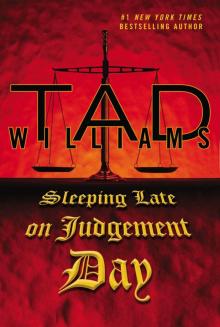 Sleeping Late on Judgement Day
Sleeping Late on Judgement Day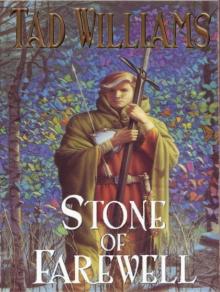 Stone of Farewell
Stone of Farewell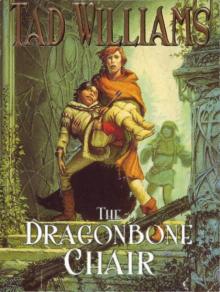 The Dragonbone Chair
The Dragonbone Chair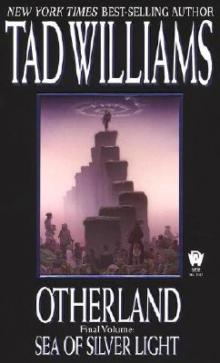 Sea of Silver Light
Sea of Silver Light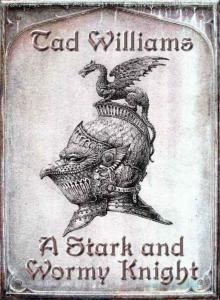 A Stark and Wormy Knight
A Stark and Wormy Knight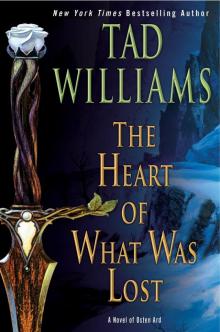 The Heart of What Was Lost
The Heart of What Was Lost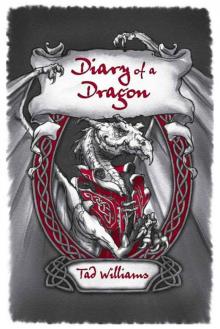 Diary of a Dragon
Diary of a Dragon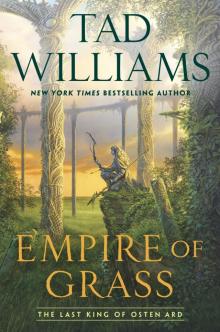 Last King of Osten Ard 02 - Empire of Grass
Last King of Osten Ard 02 - Empire of Grass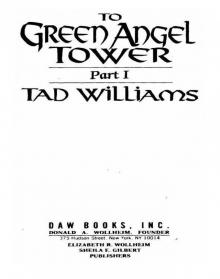 To Green Angel Tower, Volume 1
To Green Angel Tower, Volume 1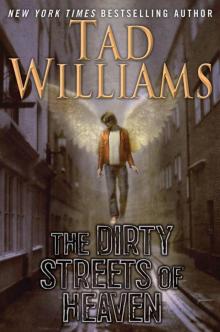 The Dirty Streets of Heaven
The Dirty Streets of Heaven River of Blue Fire
River of Blue Fire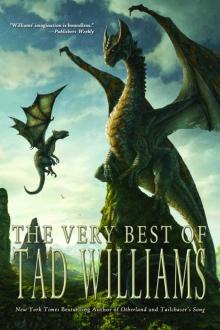 The Very Best of Tad Williams
The Very Best of Tad Williams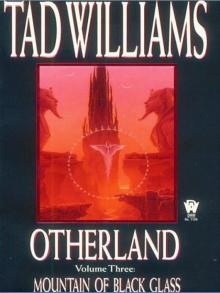 Mountain of Black Glass
Mountain of Black Glass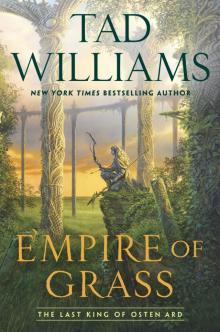 Empire of Grass
Empire of Grass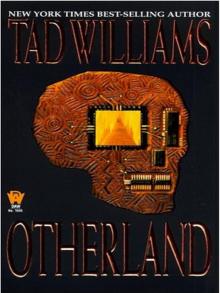 City of Golden Shadow
City of Golden Shadow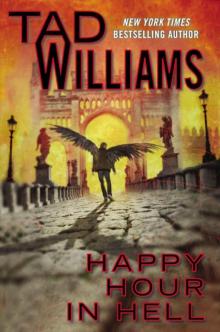 Happy Hour in Hell
Happy Hour in Hell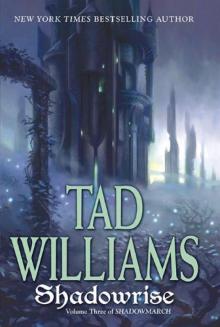 Shadowrise
Shadowrise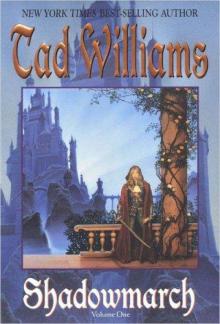 Shadowmarch
Shadowmarch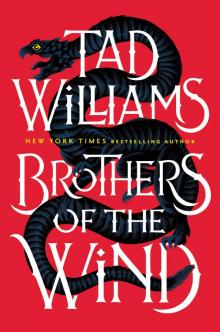 Brothers of the Wind
Brothers of the Wind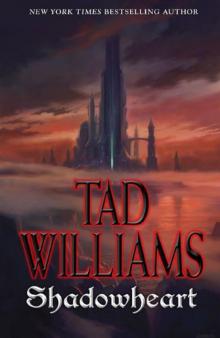 Shadowheart
Shadowheart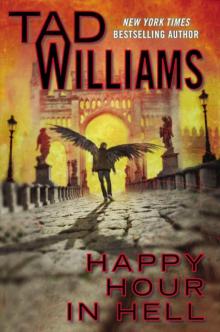 Bobby Dollar 02 - Happy Hour In Hell
Bobby Dollar 02 - Happy Hour In Hell The War of the Flowers
The War of the Flowers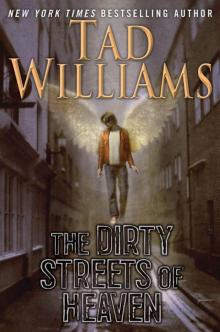 The Dirty Streets of Heaven bd-1
The Dirty Streets of Heaven bd-1 Tad Williams - The War of the Flowers (retail) (pdf)
Tad Williams - The War of the Flowers (retail) (pdf) Shadowheart s-4
Shadowheart s-4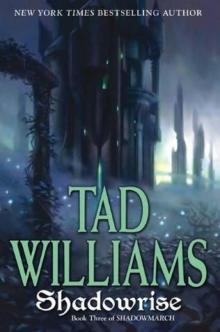 Shadowrise s-3
Shadowrise s-3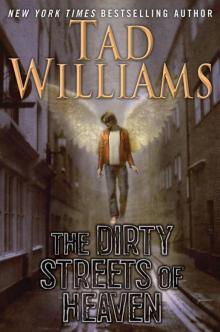 The Dirty Streets of Heaven: Volume One of Bobby Dollar
The Dirty Streets of Heaven: Volume One of Bobby Dollar The Stone of Farewell
The Stone of Farewell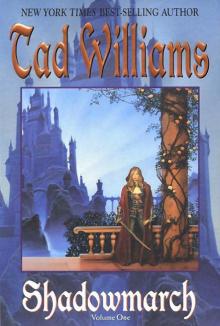 (Shadowmarch #1) Shadowmarch
(Shadowmarch #1) Shadowmarch The Secrets of Ordinary Farm of-2
The Secrets of Ordinary Farm of-2 Shadowmarch s-1
Shadowmarch s-1![Bobby Dollar [04] God Rest Ye Merry, Gentlepig Read online](http://i1.bookreadfree.com/i1/04/06/bobby_dollar_04_god_rest_ye_merry_gentlepig_preview.jpg) Bobby Dollar [04] God Rest Ye Merry, Gentlepig
Bobby Dollar [04] God Rest Ye Merry, Gentlepig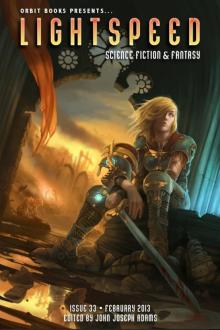 Lightspeed Issue 33
Lightspeed Issue 33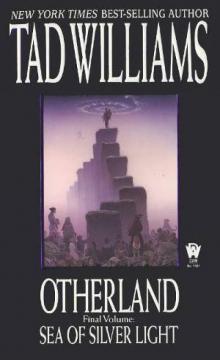 Sea of Silver Light o-4
Sea of Silver Light o-4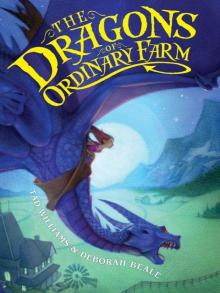 The Dragons of Ordinary Farm of-1
The Dragons of Ordinary Farm of-1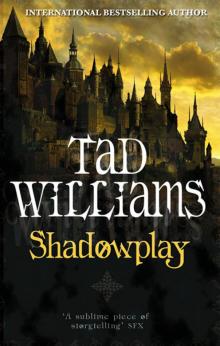 Shadowplay s-2
Shadowplay s-2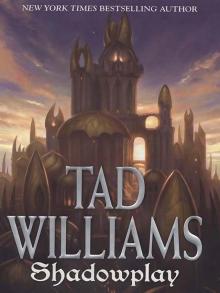 (Shadowmarch #2) Shadowplay
(Shadowmarch #2) Shadowplay